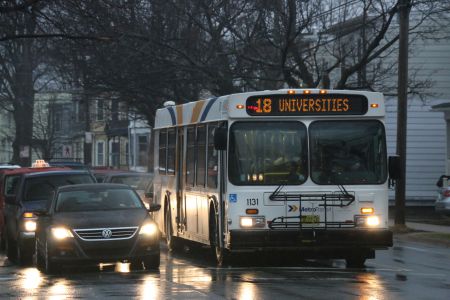K'jipuktuk (Halifax) - Kendall Worth considers himself lucky. His monthly Metro Transit bus pass is covered by income assistance, but he knows many other low-income people who aren’t as fortunate.
Worth has been living on income assistance for the past 14 years. He says he receives a maximum of $535 per month to pay his rent and power bill, and an allowance of $230 to cover all of his other expenses.
The province estimates approximately 34,000 Nova Scotians are living in poverty, and of that group only 13,000 receive support from Employment Services and Income Assistance.
As a poverty activist, Worth has seen the difference having access to affordable transportation has had in improving the lives of low-income people.
“When you’re on income assistance you are actually expected to be looking for work and find a way some day to get off the system,” he says.
Worth himself is a perfect example. He relies on the bus for transportation to and from his main other source of income--a part-time job handing out Metro newspapers. (Worth is also a Media Co-op contributor and Tide distributor.)
“I can sometimes be on the bus up to four times a day,” he says.
The issue of poverty and transportation was re-ignited after the Halifax Regional Council deferred a vote to give low-income people a break on their monthly bus pass in a meeting last week.
The Transportation Standing Committee put forward a recommendation that council implement a low-income bus pass pilot program for six months, beginning in May.
The discounted pass would cost $30, instead of the regular $80. Metro Transit suggested council use Revenue Canada’s Low-Income Cut Off (LICO) of $31,000 to set the standard for eligibility.
Regina, Sask., Victoria, B.C., and Windsor, Ont. are cities comparable in size to HRM with similar low-income transit pass programs.
Even though council unanimously agreed on the need for a discounted bus pass, at least in principle, they debated on who should qualify for the discount.
The big question: should people already receiving income assistance be exempt so they cannot receive more than one discount?
In a statement last week, a communications advisor at the Nova Scotia Department of Community Services said the “Employment Support and Income Assistance (ESIA) program provides funding for a bus pass to eligible recipients in accordance with the (transportation) policy.”
Section three of the policy states a person is eligible for transportation if they require it for, “employment, training, upgrading, volunteer activity, job search, attendance at Employment Services or any other approved activity.”
But as Worth explains, getting a bus pass is not that easy.
“(ESIA) doesn’t cover it for everyone on assistance ... I know another guy who’s on the system and he’s getting a hard time getting his bus pass covered so he can go around and put his resumes in places to look for work.”
Because, he says, “there’s no way he can prove that he’s actually using the bus pass for that reason in the run of his days.”
Income assistance will only provide a bus pass for someone if they have a job, Worth says. Otherwise income assistance will grant a smaller amount of money to purchase bus tickets to use transit for medical appointments.
“Those who depend on the bus to go visit their family members will not be able to use (bus tickets) for that purpose.” Without regular access to transportation, low-income people face social isolation, Worth warns.
Metro Transit has a number of other discount programs already in place, such as the initiative where seniors over 65 can ride the bus for free on Tuesdays.
But Councillor Russell Walker still believes the city “should be doing more and going further than this to help the low-income and I don’t mean the people on social assistance.”
The Transit Standing Committee’s report on the low-income transit program says subsidized monthly bus passes would most benefit the working poor, who are those low-income people with full-time or part-time jobs.
The report is in line with Nova Scotia’s 2013 Poverty Reduction Strategy, which says people who continually struggle to make ends meet are among the most “financially vulnerable,” because they neither qualify for income assistance or have any savings set aside.
Worth agrees, but adds that Metro Transit shouldn’t forget about Halifax’s homeless population either. “They can’t afford to pay for a bus pass, or even a discounted bus pass. Those people haven’t got any money.”
Council voted to shelve the discounted bus pass program until Metro Transit provides a report that gives specific criteria of who qualifies for the discount and how the pilot is to be implemented.



